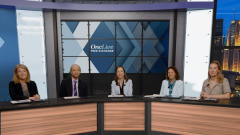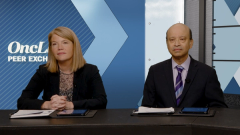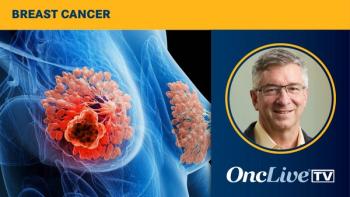
Identifying Patients Suitable for Adjuvant Neratinib
Drs Tripathy and McArthur touch on the use of extended adjuvant therapy with neratinib and identify patients who might be suitable for this regimen, including those high-risk patients with residual disease after neoadjuvant therapy.
Episodes in this series

Transcript:
Sara Hurvitz, MD: I know that there are studies ongoing looking at different therapies we can use in the adjuvant setting. Virginia brought up the use of neratinib. So I want to ask you, Debu, when are you using neratinib in the extended adjuvant setting in light of the fact that most of us are giving [our high-risk patients] drugs like pertuzumab and T-DM1 [trastuzumab emtansine]?
Debu Tripathy, MD: Well, I do think that there are patients at high risk for ongoing recurrence. I do use the ExteNET trial data, which took patients who had completed all of their therapy, including their trastuzumab, and randomized [them] to neratinib or not. And it did show a reduction in the odds of recurrence and particularly in hormone receptor-positive cancers and particularly in higher risk cases. Those were node-positive and especially in those with residual disease, which we know is a high-risk group, residual disease after neoadjuvant therapy. So that’s the group I use it in. That trial had a lot of issues in terms of how it was analyzed and conducted. It was a little unusual in that it passed hands several times, but it is the best we have, and I do think these patients are at high risk. So that’s the group I use it in.
Sara Hurvitz, MD: Heather, I’m going to push that a little bit further. You have a high risk, let’s say stage III node-positive, ER+, HER2 [human epidermal growth factor receptor 2]–positive. You give therapy, TCHP regimen [docetaxel, carboplatin, trastuzumab, and pertuzumab], [they have a] pathologic CR [complete response], but they started at stage III. Are you going to discuss neratinib with them?
Heather McArthur, MD: Well, as we know, pathologic complete response is very highly correlated for this subtype of breast cancer with cure rates. And so there’s an excellent forecast for that patient population. And there are a lot of issues, not just systemic therapy issues, but also surgery questions that are being asked and answered.
Do those patients really require axillary dissection if they’ve had clinical response? [There are] radiation questions. Do those patients require extensive radiation after surgery as well? So typically I would complete the year of HER2-directed therapy for that patient, but I probably wouldn’t prescribe neratinib. Neratinib is typically a drug that I prescribe, as Debu pointed out, in my very high-risk patients who have hormone receptor node-positive disease who don’t typically have a complete response. Of course, the ExteNET data predated our systemic use of pertuzumab so we don’t really know how to reconcile that data. But I have used it in selective patients who are particularly young and at very high risk of recurrence.
Transcript edited for clarity.






































